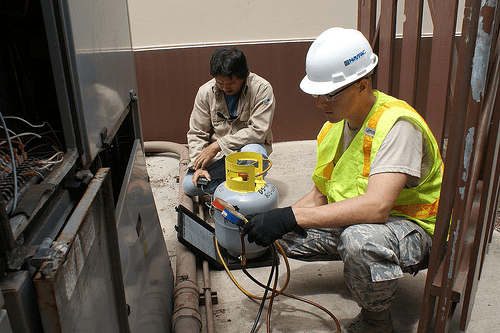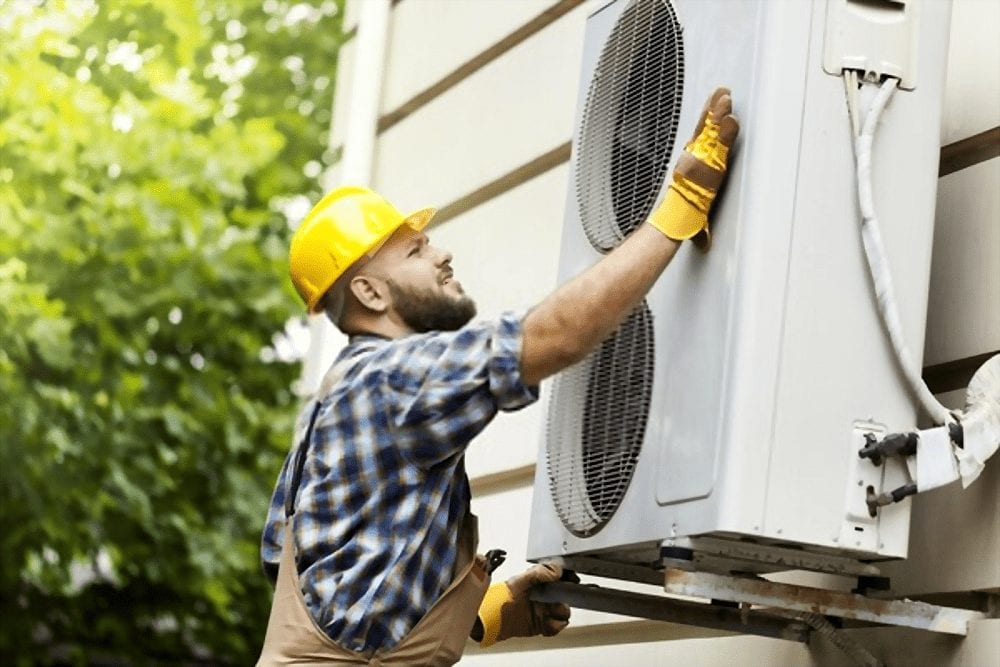How to Extend HVAC Lifespan Through Consistent heat pump service
How to Extend HVAC Lifespan Through Consistent heat pump service
Blog Article
Choosing Between a Warmth Pump and Furnace: Key Considerations for Your A/c Requirements
When examining heating alternatives for a/c requires, the choice between a warmth pump and a furnace can be complicated. Each system offers unique benefits customized to specific environments and energy efficiency objectives. Comprehending these differences is necessary for making an educated choice. Trick elements such as installment expenses and ecological influence better make complex the choice process. Which alternative truly lines up with one's convenience and sustainability preferences? The adhering to sections will certainly explore these factors to consider carefully.
Recognizing Warm Pumps: Just How They Work and Their Advantages
While several house owners consider numerous heating choices, understanding exactly how heat pumps function and their benefits can greatly affect their choice. Heat pumps run by transferring warm instead of producing it. In the wintertime, they draw out warmth from the outside air or ground and transfer it inside, while in the summertime, they reverse this process, cooling down the home by getting rid of warmth outside. This dual capability makes them versatile for year-round environment control.One of the primary benefits of heatpump is their energy efficiency. They use significantly less electrical energy contrasted to conventional furnace, possibly resulting in lower energy expenses (heat pump service). Furthermore, warmth pumps have a smaller sized carbon footprint, making them an ecologically friendly option. They additionally call for much less upkeep than standard systems, adding to lasting price financial savings. Overall, understanding the auto mechanics and advantages of warm pumps can assist home owners make educated choices concerning their heating and cooling needs
Exploring Heating Systems: Types, Operation, and Benefits
Heaters can be found in numerous kinds, including gas, electrical, and oil models, each with distinct operational systems. Recognizing these distinctions is crucial, as they influence performance and home heating performance. In addition, heaters use many benefits, such as consistent warmth outcome and dependability in chillier climates.
Kinds of Heaters
Heating unit can vary substantially in style and operation, with heaters being a prominent choice amongst house owners. There are several sorts of heating systems, each utilizing various fuel resources and innovations. Gas furnaces are usual, leveraging gas to create warmth efficiently. Electric heaters, on the various other hand, utilize electrical resistance to generate warmth, typically favored for their straightforward installment. Oil heaters, while much less typical, are reliable in areas with restricted gas access (heat pump installation ooltewah tn). In addition, condensing heaters optimize power effectiveness by recycling and capturing exhaust gases. Each type runs through a system of heat exchangers and ductwork to disperse cozy air throughout a home. Comprehending the differences in between these furnace types is crucial for informed a/c choices
Benefits of Heating systems
For home owners seeking trustworthy heat throughout cold months, the advantages of heaters are significant. Heating systems supply regular heating, guaranteeing also temperature levels throughout the home. They are specifically effective in extreme cold, commonly outperforming heatpump in icy problems. Numerous kinds, consisting of gas, electrical, and oil heaters, provide adaptability to fulfill varied requirements and preferences.Furnaces likewise often tend to have reduced initial installment prices compared to warmth pumps, making them a more available choice for numerous. Their robust design adds to a much longer lifespan, with many units lasting over 15 years with proper maintenance. Additionally, modern furnaces are typically furnished with sophisticated innovation for enhanced efficiency, which can lead to reduced power costs. Generally, heating systems stay a reliable choice for effective home heating.

Power Efficiency: Comparing Warmth Pumps and Furnaces
When comparing energy performance between warm pumps and heaters, the Seasonal Power Effectiveness Proportion (SEER) plays a necessary role in figuring out efficiency. Additionally, an operational expense evaluation discloses the long-term monetary ramifications of each system. Recognizing these factors can direct house owners in making educated choices about their heating services.
Seasonal Power Performance Proportion
Energy efficiency plays a vital duty in the decision-making procedure in between heat pumps and furnaces, particularly when taking into consideration the Seasonal Energy Efficiency Proportion (SEER) This statistics actions the cooling performance of heatpump over a whole air conditioning period, giving a standard means to review efficiency. Greater SEER scores suggest greater energy efficiency, converting to reduced power usage and decreased utility bills. In contrast, heaters are generally assessed making use of the Yearly Gas Use Effectiveness (AFUE) ranking, which reflects home heating effectiveness. When comparing these 2 systems, home owners ought to prioritize SEER rankings for warmth pumps, as they straight impact overall power savings and environmental sustainability. A complete understanding of SEER can significantly influence the lasting fulfillment and cost-effectiveness of the selected heating and cooling solution.
Functional Cost Evaluation
Comprehending the operational expenses related to warmth pumps and heating systems is vital for home owners examining their options. Warmth pumps normally provide greater energy efficiency, transforming electric power into warm with minimal waste. This leads to lower regular monthly energy expenses, particularly in modest climates. Conversely, standard heating systems, particularly gas versions, may have reduced in advance prices however can sustain higher operational costs over time because of sustain prices and performance ratings.Moreover, heatpump can work as both home heating and cooling systems, potentially lowering the requirement for separate a/c units. While preliminary financial investments for heatpump may be greater, their lasting click to investigate savings in energy effectiveness can make them an extra affordable option for lots of households. Careful analysis of regional power prices is important to figure out the very best choice.
Setup Expenses: What to Anticipate for every Heater
Installment prices for furnace can vary substantially in between heatpump and heaters, affecting homeowners' choices. Heatpump generally have greater upfront installment costs, usually ranging from $3,500 to $8,000, depending upon the unit dimension and intricacy of setup. This includes the outdoor unit, interior handling click for source system, and required ductwork modifications. Conversely, furnaces often tend to have reduced first expenses, averaging between $2,500 and $6,000, which can be appealing for budget-conscious homeowners. However, installation expenditures can boost if substantial ductwork is required.Moreover, the option of fuel type for heaters-- gas, lp, or electric-- can additionally influence setup costs. While heatpump provide energy effectiveness, their first investment might hinder some purchasers. Eventually, reviewing setup expenses alongside lasting financial savings and effectiveness will aid homeowners in making educated choices regarding their heater.
Climate Factors To Consider: Which System Carries Out Better in Your Area
How do climate problems affect the efficiency of furnace? The performance of heatpump and furnaces can differ substantially depending upon the local climate. In moderate climates, warm pumps excel by effectively transferring warmth from the outside air, making them an energy-saving choice. Nevertheless, their efficiency lessens in extremely cool temperatures, where they might battle to draw out adequate warmth. Conversely, furnaces, specifically gas versions, provide trustworthy and regular heat regardless of outside conditions, making them preferable in cooler regions.In locations that experience milder winter seasons, warmth pumps can run successfully year-round, offering both home heating and air conditioning. In comparison, areas with rough winters frequently gain from the robustness of heating systems. Eventually, comprehending the local environment is essential when determining in between a heatpump and a heater, as it directly affects their operational effectiveness and total efficiency.
Upkeep Demands: Long-Term Take Care Of Heat Pumps vs. Furnaces
While both heatpump and furnaces call for normal maintenance to guarantee peak performance, their certain requirements and treatment routines vary considerably. Heating systems generally need much less constant interest, with annual evaluations being enough to inspect for gas leakages, tidy filters, and evaluate general functionality. Their easier layout usually enables for simple repairs.In comparison, heatpump require semiannual maintenance as a result of their double duty in heating & cooling. This includes cleaning coils, checking cooling agent levels, and making certain that both the interior and outside systems work at their ideal. Furthermore, heatpump maintenance commonly entails more complex parts, making professional maintenance essential.Neglecting maintenance can bring about lessened efficiency and boosted power costs for both systems. Ultimately, home owners should think about these long-term care requirements when picking between a warm check that pump and a heating system, as positive upkeep can extend the life-span and performance of either system substantially.
Environmental Effect: Choosing a Sustainable Heating Choice
The ecological effect of heating systems is an important assessment for home owners looking for lasting choices. Heatpump are normally a lot more energy-efficient than conventional heaters, as they move warm rather than produce it, substantially minimizing carbon discharges. By utilizing renewable resource resources, such as air-source or geothermal warmth pumps, homeowners can even more reduce their eco-friendly footprint.On the various other hand, gas heaters produce greenhouse gases and add to air pollution, though they commonly provide higher warmth result. Nevertheless, improvements in innovation have resulted in the advancement of high-efficiency heaters that reduce emissions.Ultimately, picking a heating system entails considering efficiency against environmental impact. Home owners are encouraged to assess regional energy sources and incentives for renewable systems, ensuring a selection that straightens with both individual convenience and environmental duty. The choice influences not only immediate convenience but likewise long-lasting sustainability and environmental wellness.
Frequently Asked Inquiries
Just How Long Do Warmth Pumps and Furnaces Usually Last?
The life expectancy of heatpump commonly ranges from 15 to two decades, while heating systems can last in between 15 to 30 years. Normal upkeep substantially influences their durability and performance in offering heating services.
Can I Make Use Of a Heatpump in Exceptionally Cold Climates?
Heat pumps can operate in incredibly chilly environments, yet their efficiency lessens as temperatures decline. In such problems, extra heating sources might be essential to maintain comfy indoor temperature levels and assure peak efficiency.

What Is the Sound Degree of Warmth Pumps Versus Furnaces?
The sound levels of heatpump and heaters differ significantly. Typically, warmth pumps operate more quietly than standard heaters, making them preferable for those delicate to seem, while heaters may produce louder operational noises throughout heating cycles.
Are Heat Pumps Suitable for Both Heating & Cooling?
Heatpump are undoubtedly suitable for both home heating and air conditioning (heat pump installation ooltewah tn). They operate by transferring warmth, providing efficient temperature control year-round, making them a versatile option for homeowners looking for an all-in-one cooling and heating option
What Dimension Furnace Do I Need for My Home?
Figuring out the ideal dimension home heating system for a home requires reviewing elements such as square footage, insulation top quality, neighborhood environment, and the home's layout. Consulting an expert can assure an accurate analysis and excellent comfort. Warm pumps normally offer higher power performance, converting electric energy right into warm with marginal waste. In modest climates, warm pumps stand out by effectively transferring heat from the outdoors air, making them an energy-saving option. Alternatively, furnaces, specifically gas models, supply trusted and constant warmth regardless of exterior conditions, making them better in colder regions.In locations that experience milder winters, warmth pumps can run effectively year-round, providing both heating and air conditioning. Warmth pumps are typically extra energy-efficient than standard heating systems, as they move heat rather than create it, considerably minimizing carbon emissions. By utilizing renewable power sources, such as air-source or geothermal warmth pumps, property owners can additionally decrease their ecological footprint.On the other hand, natural gas heaters produce greenhouse gases and add to air pollution, though they frequently offer higher warm outcome.
Report this page